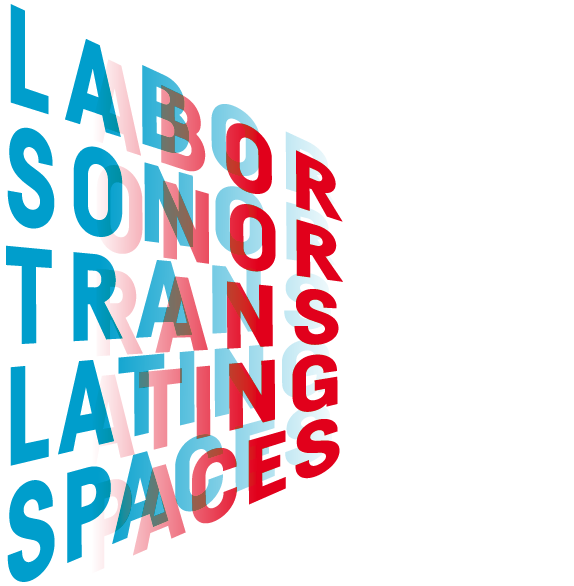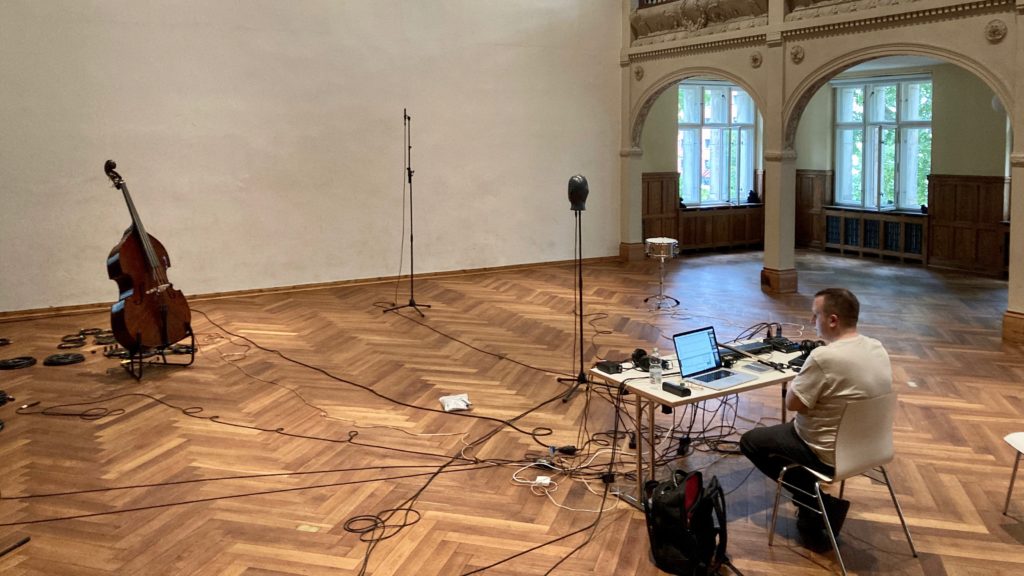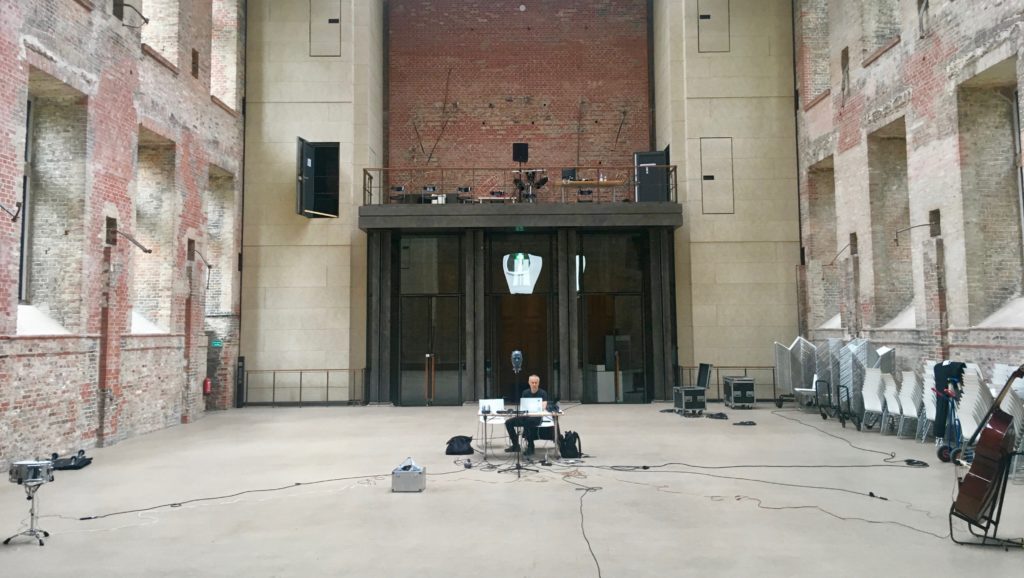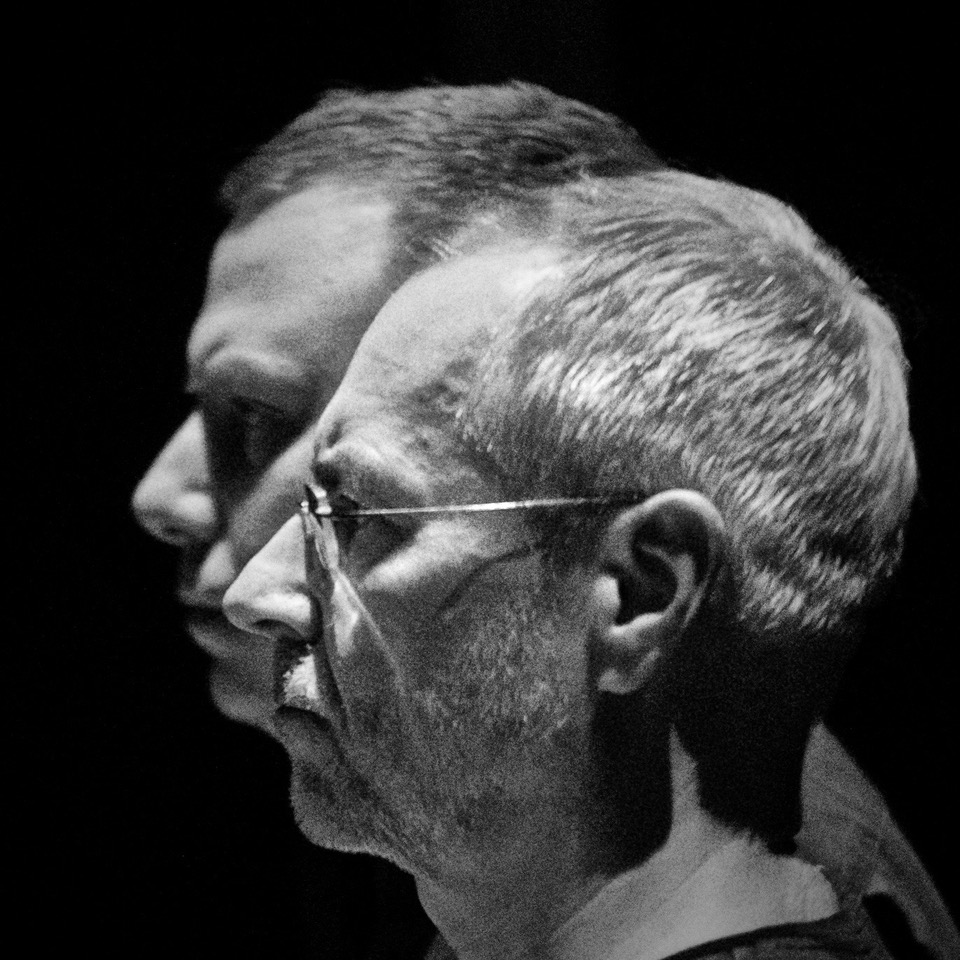
utrumque
Gerhard Eckel & Ludvig Elblaus
entangling resonating bodies – audience, site and ensemble
St. Elisabeth Song Cycle
St. Elisabeth Song Cycle wird gleichzeitig in der Villa Elisabeth und in der St. Elisabeth-Kirche aufgeführt
Im St. Elisabeth Song Cycle setzt sich utrumque mit einer ortsspezifischen Form der Komposition auseinander. Dabei werden die Raumakustiken der St. Elisabeth-Kirche und der Villa Elisabeth miteinander verschränkt. In jedem Raum wird ein Ensemble aus elektroakustischen Instrumenten platziert – ein Kontrabass, eine kleine Trommel, ein Lautsprecher und ein Mikrofon.
Die Musik wird durch die Interventionen der zwei Performer, Eckel und Elblaus, angeregt und geformt werden. Aus einem enormen Raum möglicher Bezüge wird eine Reihe von Verbindungen komponiert, indem ein Input aufgenommen, digital bearbeitet und manipuliert und dann als Ergebnis woanders im Hybridraum präsentiert wird.
Das Publikum ist eingeladen, mit utrumque gemeinsam zu erleben, wie dasselbe Material sich in den beiden unterschiedlichen Räumen entfaltet, wie die jeweiligen Orte unterschiedliche Interventionen suggerieren, und wie die ortsgebundene Komposition den Ort dazu bingt, seinen zyklischen Gesang anzustimmen.
Villa Elisabeth, Invalidenstraße 4, 10115 Berlin
Freitag 27.08.21 18:00 / 19:00 / 20:00 / 21:00
Dauer: 4 Stunden

St. Elisabeth Kirche, Invalidenstraße 4A, 10115 Berlin
Freitag 27.08.21 18:00 / 19:00 / 20:00 / 21:00
Dauer: 4 Stunden

video documentation—concept, edited by: Isabell Spengler
camera by: Lilli Kuschel, Stefan Korsinsky, Isabell Spengler
sound recorded and mixed by: utrumque (Gerhard Eckel & Ludvig Elblaus)
St. Elisabeth Song Cycle
St. Elisabeth Song Cycle will be performed simultaneously in Villa Elisabeth and St. Elisabeth Kirche
In the St. Elisabeth Song Cycle, utrumque is exploring site specific composition that entangles the room acoustics of the bicameral hybrid space of the St. Elisabeth Church and Villa Elisabeth. In each space, an ensemble of electroacoustic instruments is placed, symmetrical in their components, a double bass, a snare drum, a speaker and a microphone.
The music will be guided and shaped by interventions of the two performers, Eckel and Elblaus. The augmented instruments are imbued with the capability of being acoustically activated by electronic means, and all components form an acoustic network that also links the two rooms. From this massive space of possible connections, a sequence of links are composed, taking an input, manipulating it using digital signal processing, and presenting the result somewhere else in the hybrid space.
The audience is invited to join utrumque in experiencing how the same material unfolds in the two different spaces, how the different sites invite different kinds of interventions, and how the site-specific composition allows the site to sing its cyclical song.
Villa Elisabeth, Invalidenstraße 4, 10115 Berlin
Friday 8/27/2021 18:00 / 19:00 / 20:00 / 21:00
Duration: 4 hours

St. Elisabeth Kirche, Invalidenstraße 4A, 10115 Berlin
Freitag 8/27/2021 18:00 / 19:00 / 20:00 / 21:00
Duration: 4 hours

video documentation—concept, edited by: Isabell Spengler
camera by: Lilli Kuschel, Stefan Korsinsky, Isabell Spengler
sound recorded and mixed by: utrumque (Gerhard Eckel & Ludvig Elblaus)
Für Gerhard Eckel (utrumque) ist Klang ein Mittel zur Erkundung verschiedener Weisen der Welterzeugung. Ziel seiner Arbeiten ist die Verschränkung ästhetischer und epistemischer Aspekte der Klangkunst. Ästhetische Erfahrung wird dabei als Hybrid aus Handlung, Wahrnehmung und Reflexion verstanden. Seine Arbeiten sind Resultate von Forschungsprozessen, die sich der Praktiken der Komposition, Choreographie und Installationskunst, sowie des Interaktionsdesigns und Instrumentenbaus bedienen. Gerhard Eckel ist Professor für Computermusik und Multimedia an der Universität für Musik und darstellende Kunst Graz. Neben seiner künstlerischen Praxis und der Lehre leitet er transdisziplinäre Forschungsprojekte und betreut wissenschaftliche und künstlerische Doktorate.
http://iem.at/~eckel/
Ludvig Elblaus (utrumque)
ist Künstler und Forscher und arbeitet hauptsächlich mit computergestützten Medien, um akustische und elektronische Musik, Klangkunst, audiovisuelle Installationen, Museumsausstellungen sowie Beiträge zu gemeinschaftlichen größeren Werken wie Opern-, Theater- und Tanzaufführungen zu schaffen. In seiner künstlerischen Praxis untersucht er generative komplexe Systeme, Emergenz, endlose Variation und stochastische Prozesse. Materialität und Handwerk sind ebenfalls zentral für seine Arbeit, ebenso wie erfahrungsbezogene Aspekte sehr langsamer und langwieriger zeitlicher Strukturen und tiefes Zuhören. Er promovierte in der Gruppe Klang- und Musikinformatik in der Abteilung für Medientechnologie und Interaktionsdesign an der KTH Royal Institute of Technology. http://ludvigelblaus.com/
For Gerhard Eckel (utrumque), sound is a means for exploring different ways of world making. The aim of his works is the entanglement of aesthetic and epistemic aspects of sound art. Aesthetic experience is understood as a hybrid of action, perception and reflection. His works are the results of research processes that make use of the practices of composition, choreography and installation art, as well as interaction and instrument design. Gerhard Eckel is professor for computer music and multimedia at the University of Music and Performing Arts Graz. In addition to his artistic practice and teaching, he leads transdisciplinary research projects and supervises scientific and artistic doctorates.
http://iem.at/~eckel/
Ludvig Elblaus (utrumque)
is an artist and researcher working primarily with computational materials to create acoustic and electronic music, sound art, audio-visual installations, museum exhibits as well as contributions to collaborative larger works in several traditions, e.g. opera, theatre, and dance. His current academic home is the NAVET Center for Art, Technology, and Design, at the KTH Royal Institute of Technology, where he also got his PhD in Sound and Music Computing in 2018. Other previous studies include electroacoustic studio techniques and composition, and musicology. His artistic practice explores generative complex systems, modelling as an artistic practice, the site-specific, emergence, and experiential aspects of very slow and drawn out temporal structures and deep listening. He received his doctorate in the Sound and Music Informatics Group in the Department of Media Technology and Interaction Design at the KTH Royal Institute of Technology. http://ludvigelblaus.com/
